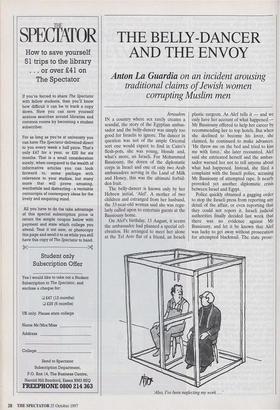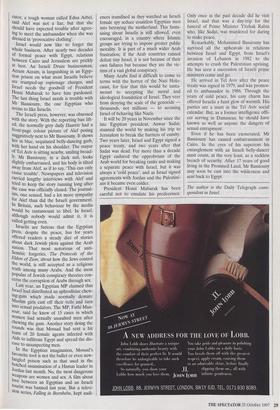THE BELLY-DANCER AND THE ENVOY
Anton La Guardia on an incident arousing
traditional claims of Jewish women corrupting Muslim men
Jerusalem IN a country where sex rarely creates a scandal, the story of the Egyptian ambas- sador and the belly-dancer was simply too good for Israelis to ignore. The dancer in question was not of the ample Oriental sort one would expect to find in Cairo's flesh-pots, she was young, blonde and, what's more, an Israeli. For Mohammed Bassiouny, the doyen of the diplomatic corps in Israel and one of only two Arab ambassadors serving in the Land of Milk and Honey, this was the ultimate forbid- den fruit.
The belly-dancer is known only by her Hebrew initial, `Alef. A mother of two children and estranged from her husband, the 33-year-old woman said she was regu- larly called upon to entertain guests at the Bassiouny home.
On Alefs birthday, 13 August, it seems the ambassador had planned a special cel- ebration. He arranged to meet her alone at the Tel Aviv flat of a friend, an Israeli plastic surgeon. As Alef tells it — and we only have her account of what happened — Mr Bassiouny offered to help her career by recommending her to top hotels. But when she declined to become his lover, she claimed, he continued to make advances. `He threw me on the bed and tried to kiss me with force,' she later recounted. Alef said she extricated herself and the ambas- sador warned her not to tell anyone about what had happened. Instead, she filed a complaint with the Israeli police, accusing Mr Bassiouny of attempted rape. It nearly provoked yet another diplomatic crisis between Israel and Egypt.
Police quickly obtained a gagging order to stop the Israeli press from reporting any detail of the affair, or even reporting that they could not report it. Israeli judicial authorities finally decided last week that there was no evidence against Mr Bassiouny, and let it be known that Alef was lucky to get away without prosecution for attempted blackmail. The state prose- Also, I've been neglecting my work .. cutor, a tough woman called Edna Arbel, said Alef was not a liar, but that she should have expected trouble after agree- ing to meet the ambassador when she was dressed in 'provocative clothing'. Israel would now like to forget the whole business. After nearly two decades of formal peace with Egypt, relations between Cairo and Jerusalem are prickly at best. An Israeli Druze businessman, Azzam Azzam, is languishing in an Egyp- tion prison on what most Israelis believe are trumped-up espionage , charges, and Israel needs the goodwill of President Hosni Mubarak to have him pardoned. The last thing Israel needs is trouble with Mr Bassiouny, the one Egyptian who seems to like Israelis.
The Israeli press, however, was obsessed with the story. With the reporting ban lift- ed, the normally grey daily Haaretz had a front-page colour picture of Alef posing suggestively next to Mr Bassiouny. It shows her in blue, sequinned belly-dancing garb, with her hand on his shoulder. The mayor of Tel Aviv is sitting nearby, smiling broad- 1Y: Mr Bassiouny, in a dark suit, looks slightly embarrassed, and his body is tilted away from Alef, as if to say, 'This can only Cause trouble'. Newspapers and television carried lengthy interviews with Alef and tried to keep the story running long after the case was officially closed. The journal- ists, one sensed, had a lot more sympathy for Alef than did the Israeli government. In Britain, such behaviour by the media would be tantamount to libel. In Israel, although nobody would admit it, it is called getting even. Israelis are furious that the Egyptian press, despite the peace, has for years offered readers a steady diet of stories about dark Jewish plots against the Arab nation. That most notorious of anti- Semitic forgeries, The Protocols of the Elders of Zion, about how the Jews control the world, is still accepted as a religious truth among many Arabs. And the most Popular of Jewish conspiracy theories con- cerns the corruption of Arabs through sex. Last year, an Egyptian MP claimed that Israel had distributed an aphrodisiac chew- ing-gum which made normally demure Muslim girls cast off their veils and turn into sexual predators. The MP, Fathi Man- sour, said he knew of 15 cases in which women had sexually assaulted men after Chewing the gum. Another story doing the rounds was that Mossad had sent a hit team of 20 female agents infected with Aids to infiltrate Egypt and spread the dis- ease to unsuspecting men. hi the Egyptian imagination, Mossad's favourite tool is not the bullet or even new- fangled poison such as that used in the botched assassination of a Hamas leader in Jordan last month. No, the most dangerous weapons are women and sex. A film about Inve. between an Egyptian and an Israeli tourist was banned last year. But a televi- sion series, Falling in Beersheba, kept audi- ences transfixed as they watched an Israeli female spy seduce countless Egyptian men into betraying the motherland. This fanta- sising about Israelis is still allowed, even encouraged, in a country where Islamic groups are trying to impose greater public morality. It is part of a much wider Arab frustration; if the Arab countries cannot defeat tiny Israel, it is not because of their own failures but because they are the vic- tims of a vast global conspiracy.
Many Arabs find it difficult to come to terms with the horror of the Nazi Holo- caust, for fear that this would be tanta- mount to accepting the moral and ideological foundation of Israel. They veer from denying the scale of the genocide thousands, not millions — to accusing Israel of behaving like Nazis.
It will be 20 years in November since the late Egyptian president, Anwar Sadat, stunned the world by making his trip to Jerusalem to break the barriers of enmity. Two years later, Israel and Egypt signed a peace treaty, and two years after that Sadat was dead. For more than a decade Egypt endured the opprobrium of the Arab world for breaking ranks and making a separate peace with Israel, but it was always a 'cold peace', and as Israel signed agreements with Jordan and the Palestini- ans it became even colder.
President Hosni Mubarak has been careful not to emulate his predecessor. Only once in the past decade did he visit Israel, and that was a day-trip for the funeral of Prime Minister Yitzhak Rabin who, like Sadat, was murdered for daring to make peace.
Remarkably, Mohammed Bassiouny has survived all the upheavals in relations between Israel and Egypt, from Israel's invasion of Lebanon in 1982 to the attempts to crush the Palestinian uprising. He has seen a succession of Israeli prime ministers come and go.
He arrived in Tel Aviv after the peace treaty was signed in 1979, and was promot- ed to ambassador in 1986. Through the years of cold peace, his easy charm has offered Israelis a faint glow of warmth. His parties are a must in the Tel Aviv social calendar. But, as a former intelligence offi- cer serving in Damascus, he should have known as well as anyone the dangers of sexual entrapment.
Even if he has been exonerated, Mr Bassiouny has caused embarrassment in Cairo. In the eyes of his superiors his entanglement with an Israeli belly-dancer must count, at the very least, as a reckless breach of security. After 17 years of good living in the Promised Land, Mr Bassiouny may soon be cast into the wilderness and sent back to Egypt.
The author is the Daily Telegraph corre- spondent in Israel.



















































































 Previous page
Previous page